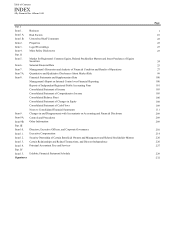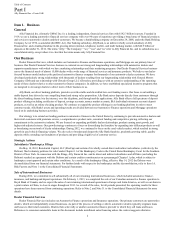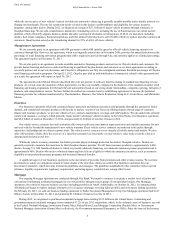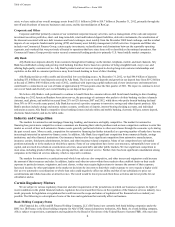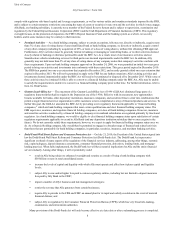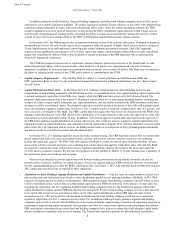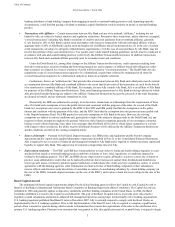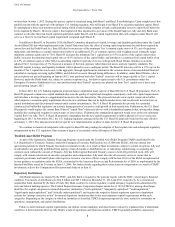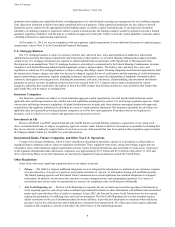Ally Bank 2012 Annual Report Download - page 11
Download and view the complete annual report
Please find page 11 of the 2012 Ally Bank annual report below. You can navigate through the pages in the report by either clicking on the pages listed below, or by using the keyword search tool below to find specific information within the annual report.9
institution from making any capital distribution, including payment of a cash dividend or paying any management fee to its holding company,
if the depository institution would become under-capitalized after such payment. Under-capitalized institutions are also subject to growth
limitations and are required by the appropriate federal banking agency to submit a capital restoration plan. If any depository institution
subsidiary of a holding company is required to submit a capital restoration plan, the holding company would be required to provide a limited
guarantee regarding compliance with the plan as a condition of approval of such plan. Failure to meet the capital guidelines could also subject
a banking institution to capital raising requirements.
At December 31, 2012, we were in compliance with our regulatory capital requirements. For an additional discussion of capital adequacy
requirements, refer to Note 21 to the Consolidated Financial Statements.
U.S. Mortgage Business
Our U.S. mortgage business is subject to extensive federal, state, and local laws, rules, and regulations in addition to judicial and
administrative decisions that impose requirements and restrictions on this business. As a Federal Housing Administration-approved lender,
certain of our U.S. mortgage subsidiaries are required to submit audited financial statements to the Department of Housing and Urban
Development on an annual basis. The U.S. mortgage business is also subject to examination by the Federal Housing Commissioner to assure
compliance with Federal Housing Administration regulations, policies, and procedures. The federal, state, and local laws, rules, and
regulations to which our U.S. mortgage business is subject, among other things, impose licensing obligations and financial requirements; limit
the interest rates, finance charges, and other fees that can be charged; regulate the use of credit reports and the reporting of credit information;
impose underwriting requirements; regulate marketing techniques and practices; require the safeguarding of nonpublic information about
customers; and regulate servicing practices, including the assessment, collection, foreclosure, claims handling, and investment and interest
payments on escrow accounts. In addition, proposals have been enacted in the U.S. Congress and are under consideration by various
regulatory authorities that would affect the manner in which the GSEs conduct their business and there is some possibility that Fannie Mae
and Freddie Mac will be subject to winding down.
Insurance Companies
Our Insurance operations are subject to certain minimum aggregate capital requirements, net asset and dividend restrictions under
applicable state and foreign insurance law, and the rules and regulations promulgated by various U.S. and foreign regulatory agencies. Under
various state and foreign insurance regulations, dividend distributions may be made only from statutory unassigned surplus with approvals
required from the regulatory authorities for dividends in excess of certain statutory limitations. Our insurance operations are also subject to
applicable state laws generally governing insurance companies, as well as laws and regulations for products that are not regulated as
insurance, such as vehicle service contracts and guarantees asset protection waivers.
Investments in Ally
Because Ally Bank is an FDIC-insured bank and Ally and IB Finance are bank holding companies, acquisitions of our voting stock
above certain thresholds may be subject to regulatory approval or notice under federal or state law. Investors are responsible for ensuring that
they do not, directly or indirectly, acquire shares of our stock in excess of the amount that may be acquired without regulatory approval under
the Change in Bank Control Act, the BHC Act, and Utah state law.
International Banks, Finance Companies, and Other Non-U.S. Operations
Certain of our foreign subsidiaries, which we have classified as discontinued operations, operate in local markets as either banks or
regulated finance companies and are subject to regulatory restrictions. These regulatory restrictions, among other things, require that our
subsidiaries meet certain minimum capital requirements and may restrict dividend distributions and ownership of certain assets. Total assets
of the regulated international banks and finance companies were approximately $15.3 billion and $13.6 billion at December 31, 2012 and
2011, respectively. Many of our other operations are also heavily regulated in many jurisdictions outside the United States.
Other Regulations
Some of the other more significant regulations that we are subject to include:
• Privacy — The GLB Act imposes additional obligations on us to safeguard the information we maintain on our customers, requires
us to provide notice of our privacy practices, and permits customers to “opt-out” of information sharing with unaffiliated parties.
The federal banking agencies and the Federal Trade Commission have issued regulations that establish obligations to safeguard
information. In addition, several states have enacted even more stringent privacy and safeguarding legislation. If a variety of
inconsistent state privacy rules or requirements are enacted, our compliance costs could increase substantially.
• Fair Credit Reporting Act — The Fair Credit Reporting Act regulates the use of credit reports and the reporting of information to
credit reporting agencies, and also provides a national legal standard for lenders to share information with affiliates and certain third
parties and to provide firm offers of credit to consumers. In late 2003, the Fair and Accurate Credit Transactions Act was enacted,
making this preemption of conflicting state and local law permanent. The Fair Credit Reporting Act was also amended to place
further restrictions on the use of information shared between affiliates, to provide new disclosures to consumers when risk-based
pricing is used in the credit decision, and to help protect consumers from identity theft. All of these provisions impose additional
regulatory and compliance costs on us and reduce the effectiveness of our marketing programs.
Table of Contents
Ally Financial Inc. • Form 10-K


